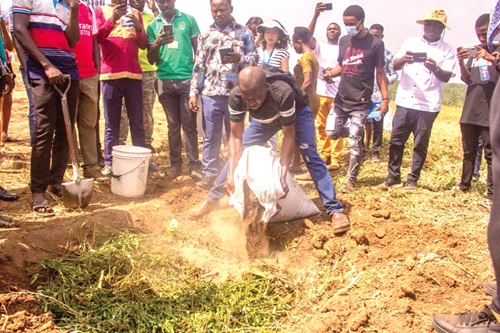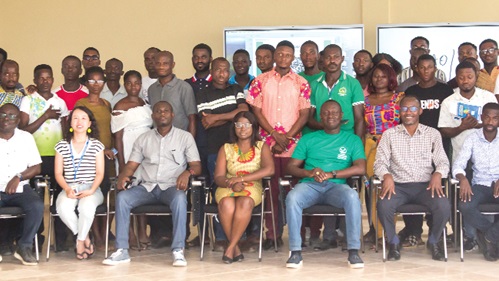
Addressing food security: Siriboe Farms, partners train youth in compost production
Recently, the SIRIBOE Agribusiness and Skills Development Institute at Juaben in the Ashanti Region hosted about 62 young agribusiness entrepreneurs as part of a capacity-building programme to expose them to compost production and digital agricultural services.
Advertisement
The programme dubbed, “Opportunities for Youth in Africa (OYA): Accelerating Jobs Creation in Agriculture and Agribusiness,” was a collaborative effort by the Food and Agriculture Organisation (FAO), the Ministry of Food and Agriculture and hosted by the 2022 National Best Farmers, Nana Yaw Sarpong Siriboe I.
The training took place on the back of the fact that agriculture is recognised as a key sector with substantial potential for expanding employment opportunities among the youth.
However, agricultural productivity in Ghana faces various challenges, including the inefficient dissemination of information on farming practices, weak linkages between farmers and agricultural service providers, and inconsistent delivery of early warning systems.
The escalating costs of inorganic fertilisers since the Russia-Ukraine war have been a threat to food production and food security not just in Ghana, but globally.
These factors underscore the urgent need to explore cost-effective solutions to enhance production efficiency.
Organic fertiliser
The cost of inorganic fertiliser ever since the Russia-Ukraine War has gone far beyond the reach of the smallholder farmers, who hold the key to food sufficiency in the country.
Therefore, the promotion of organic fertilisers, particularly through composting emerges as a critical strategy to alleviate the impact of the soaring agricultural input costs on food security and bolster the resilience of food systems.
The localised production of organic fertilisers, utilising on-farm organic waste such as crop residues and animal manure, presents a promising avenue for job creation, particularly among the youth.

Nana Yaw Sarpong Siriboe I (3rd from right) with the trainees and the trainers after the training session
Currently, a few established compost plants are operating at commercial levels in the country, but considering the demand for the product, the need to get many more people venturing into compost production is critical.
This is particularly important because farmers, especially the smallholder farmers have realised the importance of fertiliser in bumper harvests in recent times and would want to go every length to secure some for their farms.
However, with the skyrocketing cost of inorganic fertiliser, these farmers are looking for alternative ways to the inorganic and that demand falls squarely on the domain of compost producers and so, the training programme came timely.
The Agribusiness and Skills Development Institute, which is located within the Siriboe Farms Ltd offered the trainees, the opportunity of hands-on training and demonstrations.
The training programme is aimed at instilling an understanding of sustainable farming methods with an emphasis on compost production as an eco-friendly soil enrichment solution and promoting soil health.
It also aims at enhancing the youth beneficiary’s ability to leverage digital agricultural services for improved efficiency and productivity.
Programme structure
The training programme adopted a holistic learning approach by integrating theoretical knowledge with hands-on practical exercises.
The participants were engaged in expert-led sessions to gain a foundational understanding, while interactive discussions and group activities were done to deepen their knowledge collaboratively.
A dedicated demonstration site within the farm was used to facilitate a hands-on experience of the entire composting process, guiding participants from the selection of raw materials to the application of the finished product.
Also, participants had the opportunity to access various agricultural applications with practical insights into integrating digital services in the agro-based sector.
Innovation solution
Also, in an era marked by rapid technological advancements, the traditional landscapes of farming are being redefined through innovative solutions that harness the power of digitalisation.
The convergence of information technology has ushered in a new era in agriculture, empowering farmers with digital services on weather patterns, crop performance, market trends etc.
This shift enables farmers to make data-driven decisions, enhancing efficiency, sustainability and overall productivity.
These digital services are increasingly attractive to the youth, encouraging their active participation in the agriculture value chain.
Role of youth
Recognising the crucial role of youth participation in agriculture for sustained national development, there is a need for increased investments in the sector, along with comprehensive career guidance and mentoring.
To address some of these challenges, Nana Siriboe I, since he was crowned the National Best Farmer in December 2022, has been the face of pushing the agenda to entice the youth into the area of agriculture.
The introduction and launch of the “Rethink initiative,” which seeks to change the mindset of the youth towards agriculture and agribusiness as well as the inauguration of the Agribusiness and Skills Development Institute are two major blueprints as a youth and also the Akyempemhene of the Juaben Traditional Area, that he has done within the one year he served as the National Best Farmer.




